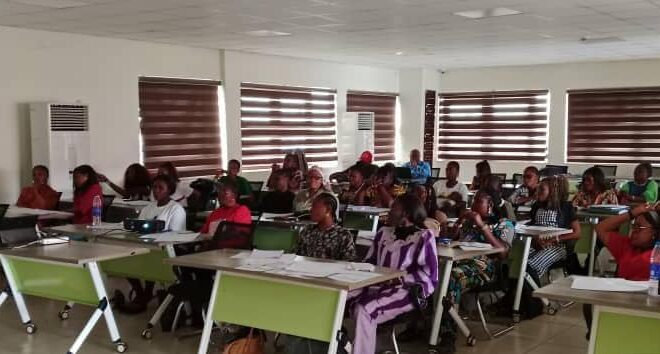
By Ese Obote-Ogwu
ASABA/Nigeria: The Karachi Rural-Urban Development Initiative (KRUDI), a leading community-based organization, has restated its commitment to sustaining HIV Testing Services (HTS) and tuberculosis screening across communities, despite dwindling donor funding and increasing operational demands.
Speaking during a one-day refresher training in Asaba for Community Volunteers and Mentor Mothers under the Global Fund’s GC7 Nigeria TB/HIV Reach Impact Project, KRUDI’s Executive Director, Mr. Chiedozie Onyeukwu, emphasized the urgent need to strengthen health systems and promote local ownership of health interventions. He stressed that high-quality data remains vital to informed decision-making, effective service delivery, and measuring collective impact.
“Data quality is not just a donor requirement—it is essential for program success and sustainability,” Mr. Onyeukwu said, urging participants to embrace precision in documentation and community service delivery.
The State Technical Officer of RedAid Nigeria (RAN), Mr. Obaro Idono, who welcomed the frontline workers, encouraged them to adhere to global best practices in health data documentation, adding that accurate reporting was crucial to strengthening Nigeria’s public health outcomes.
Other facilitators at the training included Mr. Romeo Tonwe, State TB/HIV Cascade Monitor Delta State, and Mr. Anagu Chidera Emmanuel, State Program Officer with NEPWHAN under the GC7-NTHRIP project.
The Lead Facilitator, Dr. Ofiri Ngozi of the Institute of Human Virology Nigeria (IHVN South-South), led participants through demonstrations of HTS service flow using national data collection tools. He placed special emphasis on services provided by Community Volunteers in non-traditional health settings, such as Traditional Birth Homes, and the importance of promptly linking HIV-positive pregnant women to care, early infant diagnosis (EID), and adherence support through Mentor Mothers.
Participants, drawn from 11 Local Government Areas across Delta State, engaged in hands-on simulations, peer reviews, and knowledge-sharing sessions aimed at closing existing gaps in data quality and field coordination. The session also prioritized key areas such as data validation, real-time documentation, and information security.
Held at the Professor Chike Edozien Secretariat, the training brought together 55 frontline health workers, reinforcing KRUDI’s and RedAid Nigeria’s shared vision of improving grassroots access to HIV and TB services, and building a resilient community health system in Delta State.
